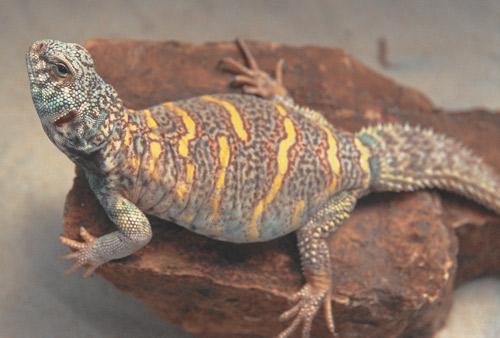
Sometimes our exotic pets make poor decisions. It’s understandable; we don’t always make the best choices for ourselves either. Fortunately, it’s often easier to control your lizard’s environment than to stop yourself from eating that whole bag of chips. With the uromastyx, choosing the right substrate is an important part of keeping them from harming themselves.
Let’s talk about why the uromastyx may need different substrate from your other reptiles.
Your lizard will eat substrate
Uromastyx is a natural digger and burrower. They enjoy substrate they can move around. What a lot of uromastyx collectors realize, though, is that their lizards also like to eat whatever they are digging in. That’s right. Just like you can’t stop eating popcorn during a movie, the uromastyx sometimes can’t help itself from mindlessly scooping up mouthfuls of substrate.
If this is the lizard’s instinct, why is it a problem? Instincts don’t always lead animals to the right choice. Many substrates, when eaten in large amounts, can cause impaction in your uromastyx’s digestive system. What this means is that they get a blockage and can neither expel waste nor take in new nutrients.
Additionally, even if your uromastyx does not develop an impaction in their gut, eating too much substrate can reduce their appetite for healthy foods, like leafy greens. An easy way to reduce the amount of substrate your reptile eats is to serve food in a dish or on a surface other than the substrate.
Substrates to avoid
Some substrates are particularly likely to cause impaction. Here are the worst culprits:
- Wood shavings or chips
- Crushed walnut shells
- “Sand” made from calcium carbonate
The most reliable sign that a uromastyx has an impaction is constipation. If this happens, offer moist fruits and vegetables to hydrate your lizard, if it will eat. Then, get it to the vet.
Safe uromastyx substrate
Despite being a desert native, uromastyx does not do best only on a sand substrate. They usually live on rock outcrops in the wild. That being said, they do enjoy digging. You can provide a somewhat natural substrate with a mixture of play sand and soil, compost, or peat moss, or a combination of these.
Before adding the substrate, place tiles or habitat décor that provides flat areas as well, and fill the substrate in around them to help keep them in place. This simulates their preferred environment and prevents the lizard from getting trapped under décor.
Another substrate option that works well for uromastyx is millet. Millet is a grain seed that is sold as bird seed.
When you use loose substrate of any kind, you’ll need to scoop feces out of the terrarium regularly. You should also completely remove the substrate, clean the tank, and place new substrate in it about once a month. This reduces odor and harmful bacteria buildup.
Despite their substrate grazing quirk, uromastyx are a fairly mellow pet to care for. Come check them out and get your other uromastyx care questions answered at The Tye-Dyed Iguana.
